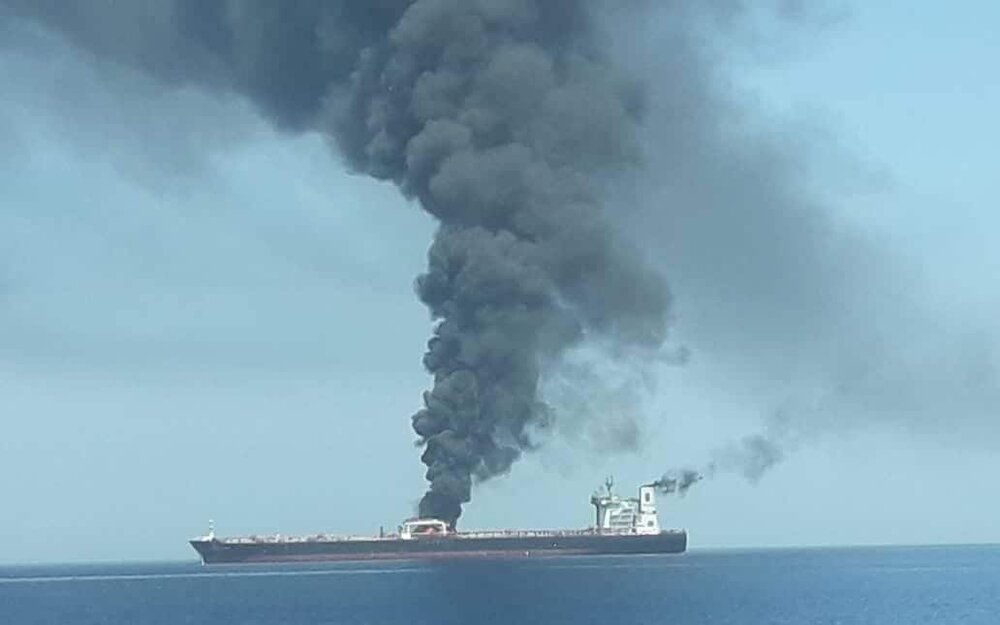U.S. allies balk at blaming Iran for tanker attack

A day after two oil tankers were attacked in the Gulf of Oman, some U.S. allies were reluctant to join the Trump administration in blaming Iran for the incident as conflicting accounts emerged, the Foreign Policy said on Friday.
U.S. President Donald Trump’s administration was quick to blame Iran for the Thursday attacks, which targeted a Norwegian-owned and a Japanese-owned vessel carrying petroleum products in the strategic chokepoint through which much of the world’s oil travels. The U.S. Defense Department released black-and-white video footage purportedly demonstrating that Iran is behind the attack, but some of the United States’ allies have held back from explicitly blaming Iran—including Japan and Norway. For its part, the Iranian government denied the U.S. accusations that it was involved.
U.S. Central Command took the unusual step of releasing footage of the incident, which it says shows Iranian special forces removing an unexploded mine from the side of one of the oil tankers damaged in the incident, a few hours after the attack. The Japanese owner of one of the tankers contradicted the account put forth by the U.S. military, saying the vessel was struck by a flying projectile and not a mine or torpedo, adding further confusion.
After the UK government conducted its own assessment, British Foreign Secretary Jeremy Hunt on Friday backed up Centcom’s account, saying in a statement that the Islamic Revolutionary Guard Corps (IRGC) was “almost certainly” behind the attacks and calling on Tehran to “cease all forms of destabilizing activity.”
But other U.S. allies, which have parted ways with Washington over its withdrawal from the 2015 nuclear accord with Iran, haven’t gone as far and appear to be treading carefully around a potentially explosive diplomatic standoff between Washington and Tehran.
German Foreign Minister Heiko Maas said the video evidence isn’t sufficient by itself. “The video is not enough. We can understand what is being shown, sure, but to make a final assessment, this is not enough for me,” he told reporters on a visit to Oslo, Norway.
Some U.S. allies may not “want to be seen as bandwagoning with a U.S. administration that may be seen as a loose cannon on this,” said Michael Eisenstadt, an expert on the region at the Washington Institute for Near East Policy, a think tank. “They’re going to want to wait until their intelligence agencies get from the American intelligence community our assessments and forensics,” he said. “They’ll want to have their own intelligence people look at the ships before they arrive at their own judgment.”
The conflicting reports of the attacks are stirring further unrest in a region already beset by tensions as the Trump administration ratchets up pressure on Iran through severe sanctions and diplomatic maneuvering. Trump in April designated Iran’s elite branch of its armed forces, the IRGC, as a terrorist organization, and Iranian President Hassan Rouhani hit back by declaring all U.S. troops in the Middle East terrorists. The latest attacks also come after the White House hit Tehran with additional sanctions as part of a so-called maximum pressure campaign to squeeze the country and sent a fresh deployment of U.S. forces to the region to deter what the administration called “credible” threats from Iran and its proxies against U.S. troops.
Iranian Foreign Minister Mohammad Javad Zarif condemned U.S. accusations that Iran was behind the incident, saying they were made without “a shred of factual or circumstantial evidence.”
Zarif even went so far as to insinuate the incident was a setup, tweeting, “Suspicious doesn’t begin to describe what likely transpired.” The attacks occurred while Japanese Prime Minister Shinzo Abe was meeting with Iran’s Supreme Leader Ali Khamenei for talks, in part to try to open a dialogue between Tehran and Trump.
On Friday, Zarif rebuffed Pompeo's allegations that Iran was to blame, saying they were part of the “sabotage diplomacy” pushed by the "B-Team".
The B-Team is a reference to hawkish U.S. national security adviser John Bolton, Israeli Prime Minister Benjamin Netanyahu, Saudi Crown Prince Mohammed bin Salman and Abu Dhabi Crown Prince Mohammed bin Zayed Al Nahyan.
Iranian Foreign Ministry spokesman Abbas Mousavi also asked, "While Japan's prime minister is meeting with the number one figure of the Islamic Republic of Iran to reduce tensions, which clandestine hands seek to undermine these efforts in the region and who benefit from it?"
Jeremy Corbyn, Britain’s Labor Party leader, has warned against blaming Iran for the tanker attack without "credible evidence", the Independent reported.
Writing on his social media account, Corbyn said, "Britain should act to ease tensions in the (Persian) Gulf, not fuel a military escalation that began with U.S. withdrawal from the Iran nuclear agreement.
"Without credible evidence about the tankers attacks, the government's rhetoric will only increase the threat of war."
‘Anti-Iranian sense’
Also, Russia on Thursday warned against rushing to attribute blame for suspected attack on oil tankers, saying the incident should not be used to stoke tensions with Tehran, Russia's state-run RIA news agency reported.
"I would take the opportunity to warn against hasty conclusions, against attempts to lay the blame at the door of those we don't like," the agency quoted Russian Deputy Foreign Minister Sergei Ryabkov as saying.
"Lately we have been seeing a strengthening campaign of political, psychological and military pressure on Iran. We wouldn't want the events that have just happened, which are tragic and shook the world oil market, to be used speculatively to further aggravate the situation in an anti-Iranian sense," Ryabkov was quoted as saying.
Russia and Iran share common interests in the Middle East. Moscow has spoken out against Washington's decision to unilaterally withdraw from a deal with Tehran on its nuclear program and impose sanctions.
Leave a Comment